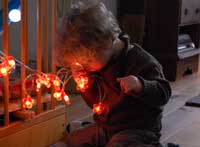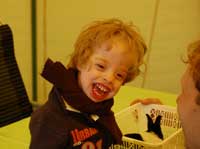Marshall-Smith Syndrome: Reaching for the STARS
 Liesbeth Laan, a school nurse based in The Hague, Netherlands, had a smooth pregnancy and delivered Joas at home in July 2006. But for the first six months of his life, the baby boy was in and out of hospital. ‘Immediately after his birth, he had breathing difficulties and stayed in the hospital for a month. He had a narrowed throat and nose and he had to be fed with a gastric tube. Because of his problems and some unusual facial features it was clear to us that Joas had a syndrome but even after many tests, no diagnosis was reached,’ recalls Henk-Willem Laan, Joas’ father. Two months later, doctors discovered that Joas had advanced glaucoma, resulting in his first surgery.
Liesbeth Laan, a school nurse based in The Hague, Netherlands, had a smooth pregnancy and delivered Joas at home in July 2006. But for the first six months of his life, the baby boy was in and out of hospital. ‘Immediately after his birth, he had breathing difficulties and stayed in the hospital for a month. He had a narrowed throat and nose and he had to be fed with a gastric tube. Because of his problems and some unusual facial features it was clear to us that Joas had a syndrome but even after many tests, no diagnosis was reached,’ recalls Henk-Willem Laan, Joas’ father. Two months later, doctors discovered that Joas had advanced glaucoma, resulting in his first surgery.
The correct diagnosis was reached practically by accident. In January 2007, as the geneticist was studying photos of children with rare diseases, he found one with the same facial features as Joas. The child had Marshall-Smith syndrome (MSS), a very rare childhood condition which involves specific facial characteristics, respiratory problems, bone maturation that is advanced for the child’s age (for example, in 1993 a newborn with MSS was found to have the ‘bone age’ of a three year-old child). The geneticist compared the characteristics to those of Joas and many were alike. An X-ray of Joas’ hand confirmed the diagnosis.
What do you do with such news? Where do you start? ‘First we needed some time to deal with it. The geneticist was honest enough to tell us that he didn’t know much about this syndrome and gave us a medical article about MSS. We were deeply shocked to read about the 3 years’ life expectancy. After a while we went searching on the Internet, but there was almost no information about MSS. We came in contact with the two other Dutch families living with MSS. Nina was 11 years old by that time and Adriana was 4 years old. The parents of these girls gave us some more information, mostly out of their own experience’, tells Joas’ father.
 As for many other parents with children suffering from rare diseases, the Laans have a “before” and an “after” Joas. But in spite of the dire future this syndrome held for their child, they would not welcome the reality passively. ‘With the other Dutch parents we started by building a website. We got in touch with other parents all over the world. The website is already available in different languages. At this moment we have contact with 21 families worldwide.’ The syndrome is so rare, and its genetic background still so unknown, that statistics do not exist. Building such a community for a very rare disease in such a short time is a huge achievement… but it’s not the only one. ‘We contacted Professor Hennekam of the Institute of Child Health at University College London and Great Ormond Street Hospital for Children in London who was willing to initiate research into MSS. We incorporated the MSS Research Foundation and initiated fund raising in support of the first research to be carried out. With help from the Dutch Rare Disease Fund and the Dutch Genetic Alliance, over € 40,000 was raised in a year, enabling not only the funding of the first research, but also the organisation of a global meeting between families.’
As for many other parents with children suffering from rare diseases, the Laans have a “before” and an “after” Joas. But in spite of the dire future this syndrome held for their child, they would not welcome the reality passively. ‘With the other Dutch parents we started by building a website. We got in touch with other parents all over the world. The website is already available in different languages. At this moment we have contact with 21 families worldwide.’ The syndrome is so rare, and its genetic background still so unknown, that statistics do not exist. Building such a community for a very rare disease in such a short time is a huge achievement… but it’s not the only one. ‘We contacted Professor Hennekam of the Institute of Child Health at University College London and Great Ormond Street Hospital for Children in London who was willing to initiate research into MSS. We incorporated the MSS Research Foundation and initiated fund raising in support of the first research to be carried out. With help from the Dutch Rare Disease Fund and the Dutch Genetic Alliance, over € 40,000 was raised in a year, enabling not only the funding of the first research, but also the organisation of a global meeting between families.’
Coinciding with the 2nd Rare Disease Day, the MSS community brought together 9 families for the first global MSS family event in Netherlands. They made this event public through the RDD website. ‘We told our story and posted a video about MSS. We came up with an acronym: Rare Diseases like MSS needs STARS: Social acceptance, Treatment, Awareness, Research, Sponsors,’ says Henk-Willem.
As well as presenting the first results of the research, which include the physical and behavioral aspects of MSS, the weekend was particularly meant to be pleasant for the children and parents. There were interesting (and fun!) programs: Children’s Animal Farm, Mum’s Beauty Program and Survival for the Dads. ‘Almost every family told us that it was a really special experience and that it made them feel less lonely – loneliness is maybe one of the most important issues of having a very rare disease. We are now a MSS family and we will be connected forever,’ declares Henk-Willem.
‘Almost every family told us that it was a really special experience and that it made them feel less lonely – loneliness is maybe one of the most important issues of having a very rare disease. We are now a MSS family and we will be connected forever,’ declares Henk-Willem.
The MSS community continues to work on awareness and fund-raising to make the second stage of the research possible. Joas is doing fine at the moment. He inspires his parents with his day to day attitude. ‘If he is not sick, he is a happy boy, even if the day before he suffered a lot. He is really our sunshine.’ Upon learning, from the first results of the research, that an American MSS patient is 29 years old, his parents carry hope that the little Joas will be here for many years to come.
This article was first published in the May 2009 issue of the EURORDIS newsletter
Author: Nathacha Appanah
Photo credits: © marshallsmith.org
